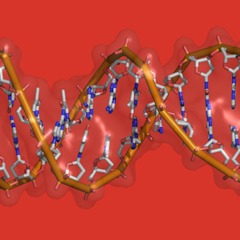
Articles on CRISPR
Displaying 81 - 100 of 119 articles

Much like the fictitious Victor Frankenstein in Mary Shelley’s novel, more and more scientists are running away from their real-life creations.

Only one Canadian has ever received the Nobel Prize for medicine, in 1923. But Canadian discoveries have been essential to stem cell research, gene sequencing and treatments for cancer.

One big challenge for gene therapies is delivering DNA or RNA safely to cells inside patients’ bodies. New nanoparticles could be an improvement over the current standard – repurposed viruses.

A new gene editing experiment explores human development. With this comes new ethical questions: How do scientists acquire embryos and how are their projects approved?

A landmark study in the UK discovered the gene that allows cells to form into embryos. If Australian researchers attempted this they could go to jail for 15 years.

With rapid advances in gene editing, states signed up to the Biological and Toxin Weapons Convention need to do more to prevent CRISPR from becoming a dangerous weapon.

The CRISPR gene-editing technique raises new questions about how we measure time and conceptualise history. Here, a cultural theorist takes on the philosophical side of this scientific breakthrough.

Americans have moved on from worrying about ‘test-tube babies’ – but there are still ethical challenges to resolve as reproductive technologies continue to advance.

A world first study shows CRISPR can remove a target gene from early stage human embryos. But with the advance in science come weighty ethical dilemmas.

A team in the U.S. is said to have safely and effectively altered human embryos. The news is a reminder that citizens must be consulted on developments potentially affecting the future of the species.

The news may have come as a surprise, but it probably shouldn’t have. A bioethics expert walks through how big a deal this announcement is – and what we should be considering now.

Simple and inexpensive gene-editing technology such as CRISPR has made the creation of genetically modified organisms much easier. But could nature still keep the upper hand?

Holding patents can be a lucrative and powerful position to be in. Here’s a proposal for how nonprofit patent holders can do more for the common good – and live up to their end of the tax break bargain.

William Isdale speaks with University of Queensland Professor Peter Koopman about CRISPR technology.

A new research paper reports dangerous side effects in CRISPR-edited mice. Some scientists are pushing back, placing blame for the unwanted mutations on the experiment, not the technique.

Researchers are starting to harness the potential of this much-hyped gene editing technique – with coming applications in medicine, biology and agriculture.

A new report from the National Academies of Science and Medicine outlines conditions that have to be met before gene editing that results in heritable genomic changes can be considered.

A report released by the US National Academies of Science and Medicine underscores the potential of gene editing and acknowledges the sensitivities in managing the ethical dimensions.

It’s possible to alter the make-up of a species such as a mosquito’s ability to pass on the deadly malaria parasite. But we need to consider the pros and cons of such gene editing technology.

Medical tourism for assisted reproductive technologies raises a host of legal and ethical questions.





